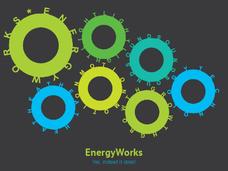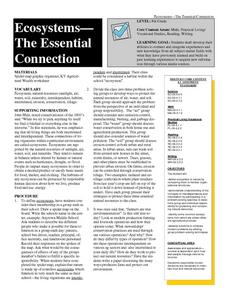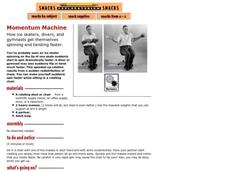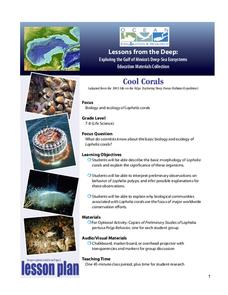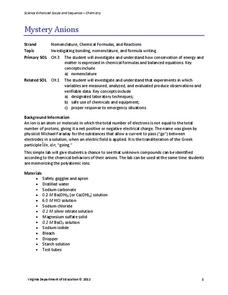National Energy Education Development Project
Energy Works: Yes, Indeed it Does!
Moving from its definition to how it moves and its different types, scholars see different examples and then move into its application and use in everyday lives, in an energy-based presentation.
Teach Engineering
Biomimicry and Sustainable Design - Nature is an Engineering Marvel
Discover how copying nature can be beneficial to humans. Scholars read articles about examples of biomimicry and its potential applications. Along the way, they learn about Nature's Nine Laws and how they relate to biomimicry. This is...
Curated OER
Ecosystems-The Essential Connection
Students develop their abilities to solve problems both in school and in a variety of situations similar to that they have encountered in life. They define the term ecosystem in nature by comparing them to familiar organizational...
Curated OER
Investigative Case - "Swampeast Missouri"
Students explore wetland hydrology and biology and decide whether or not to restore a wetland or retain dams and drainage systems. They examine the complexity of decisions regarding wetland restoration as well as investigate viewpoints...
Science Friday
Termite Symbiosis
What happens to the wood a termite eats? Pupils learn about the three types of symbiosis with pictures of symbiotic pairs. Afterward, they determine whether there is a symbiotic relationship with a termite by dissecting termites and...
Exploratorium
Momentum Machine
If you have a rotating office chair in your classroom, you can have physics pupils participate in this simple, yet effective demonstration of angular momentum. One partner sits in the chair, arms outstretched, holding heavy weights. The...
Virginia Department of Education
Acids and Bases
What did one titration say to the other titration? We should meet at the end point! Young chemists perform four experiments: dilute solution, neutralization, titration, and figuring pH/pOH.
NOAA
Marine Policy
Save the oceans! The 22nd installment of a 23-part NOAA Enrichment in Marine sciences and Oceanography (NEMO) program focuses on laws and marine policy. Pupils take part in an activity investigating fisheries stock data.
NOAA
Deep-Sea Ecosystems – Cool Corals
Young oceanographers research deep sea corals that thrive on chemosynthesis. The lesson focuses on the biology of the animal, preferred habitat, associations, and interactions.
Beyond Benign
Green"er" Precipitation Reaction
All sodium carbonate may not have the same amount of carbonate, but it should have the same percent. Learners write and balance an equation to predict the chemical reaction between sodium carbonate and zinc acetate. Through the lab...
Curated OER
Free Up the Ketchup!
Students, in teams, use given materials and their knowledge of Newton's First Law to create a device that will remove a sticky ping pong ball from a 16-oz. cup (which represents ketchup stuck in a bottle.)
Curated OER
Fourth Grade Science
In this science worksheet, 4th graders answer multiple choice questions about coastlines, electric cars, the food chain, and more. Students complete 25 questions.
Curated OER
President LBJ
Here's a quick look at the Johnson presidency. Each of his major acts are discussed with images and video web links. The Voting Rights Act, Tet Offensive, Civil Rights Act, and War on Poverty are defined.
Curated OER
My Planet Earth
The earth is a delicate and fragile thing; Why not engage your class in a craft project that will make them aware of our environment? Earth Day is celebrated as recycled materials are used to create earth window hangings. Crayons are...
E Reading Worksheets
Making Predictions #4
Show young readers how to use evidence from the text in an activity about making predictions. After reading five short passages, kids note what they think will happen next based on what they have read, and include the evidence that...
Virginia Department of Education
Soap, Slime, and Creative Chromatography
Do you think chromatography paper suffers from separation anxiety? Young chemists make soap, slime, silly putty, and experiment with chromatography in this lesson. The material includes clear instructions for each experiment along with...
Virginia Department of Education
Mystery Anions
Lost an electron? You should keep an ion them. Young chemists learn qualitative analysis in the second lesson of an 11-part chemistry series. After observing reactions of simple salts, the teacher provides pupils with unknown...
Virginia Department of Education
Predicting Products and Writing Equations
A chemistry lesson presents 14 chemical reactions for scholars to observe, write the equation, and balance the equations. Additionally, it provides ways to extend the activity as it relates to catalysts.
Global Oneness Project
Ancient and Modern Worlds
The old aphorism, "The road to Hell is paved with good intentions," might well serve as the title for a resource that asks viewers to consider the plight of the people of the Gamo Highlands, an area in southwestern Ethiopia. These...
Teach Engineering
Designing a Winning Guest Village in the Saguaro National Park
Don't desert a resource on the desert! Scholars work in groups to build on their ideas from the previous lesson to design a sustainable guest village in the Saguaro National Park. Each group produces a PowerPoint presentation to share...
Columbus City Schools
It’s Electric!
Shocking! Who knew so many great ideas existed for teaching middle schoolers about electricity? Find them all within this energetic framework. You'll light up at the variety of printable and web-based resources within! After building...
Kenan Fellows
How Much Heat Can a Phase Change Produce?
Scholars learn about heat release in phase changes. They perform calculations as they compare and contrast a science fiction passage and a home heating application.
Serendip
Food, Energy and Body Weight
High schoolers learn why humans need calories, how they control weight with food choices, and the impact of exercise on energy. Scholars then apply their understanding to a case study of lunch choices and exercise.
Serendip
How Do Muscles Get the Energy They Need for Athletic Activity?
Every muscle movement requires energy, but where does that energy come from? Scholars answer this question and more as they complete a worksheet. By following the directions, completing research, and discussing it as a class, they begin...
Other popular searches
- Water Conservation
- Water Conservation Activity
- Soil and Water Conservation
- Water Conservation Grade 5 6
- Water Conservation Florida
- Water Conservation Brochure
- Water Conservation Essays
- Water Conservation Programs
- Drought, Water Conservation
- Water Conservation Graphing
- Drought Water Conservation
- Water Cycle Conservation


